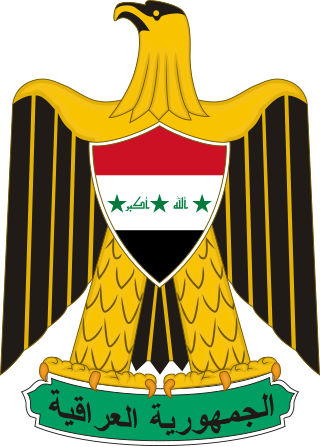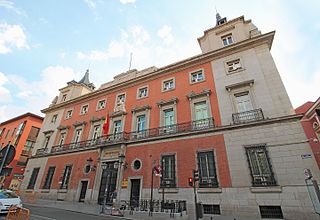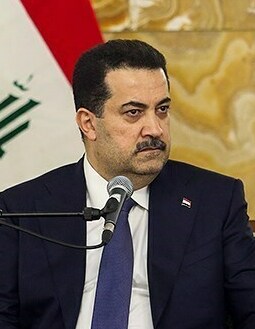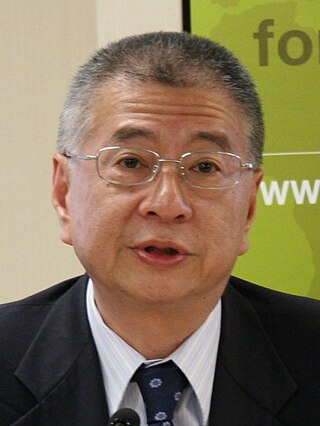
The Islamic Supreme Council of Iraq is a Shia Islamist political party in Iraq. It was established in Iran in 1982 by Mohammed Baqir al-Hakim and changed its name to the current Islamic Supreme Council of Iraq in 2007. Its political support comes from Iraq's Shia Muslim community.

The Iraqi Interim Government was created by the United States and its coalition allies as a caretaker government to govern Iraq until the drafting of the new constitution following the National Assembly election conducted on January 30, 2005. The Iraqi Interim Government itself took the place of the Coalition Provisional Authority on June 28, 2004, and was replaced by the Iraqi Transitional Government on May 3, 2005.
The Cabinet of Ministers of Ukraine, commonly referred to as the Government of Ukraine, is the highest body of state executive power in Ukraine. As the Council of Ministers of the Ukrainian SSR, it was formed on 18 April 1991, by the Law of Ukrainian SSR No.980-XII. Vitold Fokin was approved as the first Prime Minister of Ukraine.

The Cabinet of Egypt is the chief executive body of the Arab Republic of Egypt. It consists of the Prime Minister and the cabinet ministers.

The Consultative Assembly of Saudi Arabia, also known as Majlis ash-Shura or Shura Council, is the formal advisory body of Saudi Arabia. It is a deliberative assembly that advises the King on issues that are important to Saudi Arabia. It has the power to propose laws to the King of Saudi Arabia and his cabinet to prove it and pass it. It has 150 members, all appointed by the king and chosen "from amongst scholars, those of knowledge, expertise and specialists". Since 2013, the Assembly has included 30 female members out of the total of 150 members, after a 20 percent minimum quota for women was imposed. The Consultative Assembly is headed by a Speaker. As of 2016, the Speaker was Abdullah ibn Muhammad Al ash-Sheikh, in line with a tradition that kept the post in that family. The Assembly is based in al-Yamamah Palace, Riyadh.

Mostafa Pour-Mohammadi is an Iranian politician and prosecutor, who has served at different positions and cabinet posts. He was minister of interior from 2005 to 2008 and minister of justice from 2013 until 2017. Pourmohammadi is reportedly implicated in the 1988 Massacre of Iranian Prisoners.

The Ministry of Justice (MoJ) is a ministerial department of His Majesty's Government, headed by the Secretary of State for Justice and Lord Chancellor. Its stated priorities are to reduce re-offending and protect the public, to provide access to justice, to increase confidence in the justice system, and to uphold people's civil liberties. The Secretary of State is the minister responsible to Parliament for the judiciary, the court system, prisons, and probation in England and Wales, with some additional UK-wide responsibilities, e.g., the UK Supreme Court and judicial appointments by the Crown. The department is also responsible for areas of constitutional policy not transferred in 2010 to the Deputy Prime Minister, human rights law, and information rights law across the UK.

Ministry of Foreign Affairs of Azerbaijan is a Cabinet-level governmental agency of Azerbaijan Republic in charge of conducting and designing the country's foreign policy.
The federal government of Iraq is defined under the current Constitution, approved in 2005, as an Islamic, democratic, federal parliamentary republic. The federal government is composed of the executive, legislative, and judicial branches, as well as numerous independent commissions.

Established in 1920, the Ministry of Justice of Iraq (MoJ) is the federal government ministry concerned with judicial and prosecutorial training, publishing the Official Gazette, notaries public, deeds and records, and since 5 June 2004, prisons. In 2007, the ministry possessed a staff of 13,619. Also, 130 courthouses and headquarters are located at the Ministry of Justice Building.

The Ministry of Justice (MJUS) is the department of the Government of Spain responsible for preparing and carrying out the government policy in order to bring the legal system off, specially in criminal, civil, commercial and procedural law affairs, supporting the Administration of Justice and the legal and international cooperation.

The Magnitsky Act, formally known as the Russia and Moldova Jackson–Vanik Repeal and Sergei Magnitsky Rule of Law Accountability Act of 2012, is a bipartisan bill passed by the U.S. Congress and signed into law by President Barack Obama in December 2012, intending to punish Russian officials responsible for the death of Russian tax lawyer Sergei Magnitsky in a Moscow prison in 2009 and also to grant permanent normal trade relations status to Russia.

Mohammed Shayya’Sabbar Al-Sudani is an Iraqi politician who is serving as the Prime Minister of Iraq since 27 October 2022. He was the Human Rights Minister of Iraq in the Council of Ministers of Prime Minister Nouri al-Maliki from 2010 until October 2014. He was the Governor of Maysan Province between 2009 and 2010.

Angellah Jasmine Mbelwa Kairuki is a Tanzanian CCM politician and cabinet Minister. On 1 September 2023, she began her post as the Minister of Natural Resources and Tourism of Tanzania.

Andrew Nien-dzu Yang was the 29th Minister of National Defense of the Republic of China, having served 1–6 August 2013. Before this, he was the Deputy Minister of National Defense from 2009 to 2013.

The militsiya in Ukraine was a type of domestic law enforcement agency (militsiya) from 1917 until 2015. The militsiya was originally formed while Ukraine was governed by the Ukrainian Soviet Socialist Republic, part of the Soviet Union, and it continued to serve as a national police service in post-Soviet Ukraine until it was replaced by the National Police of Ukraine on 7 November 2015. The militsiya was under the direct control of the Ministry of Internal Affairs, and it was widely seen as corrupt and inconsiderable to the demands of the Ukrainian public. During Euromaidan, the Militsiya was accused of brutality against protestors as well as kidnapping Automaidan activists, leading to the reputation of the Militsiya being irreversibly damaged. This resulted in its replacement under the post-Maidan Poroshenko presidency.
Mohammed Mahdi Ameen al-Bayati is an Iraqi politician who was Minister of Human Rights from 9 September 2014 to 16 August 2015. He is a Shia Turkmen from the northern Iraqi town of Amirli. He is a leading member of the Badr Organization, a Shi'ite militia that opposed the government of Saddam Hussein from exile in Iran.
The secretary of state for justice (SEJUS) is the second-in-command to the Spanish minister of justice. The secretary of state is appointed by the monarch at the request of the justice minister and after hearing from the Council of Ministers.

The first government of Hussein Arnous was formed on 30 August 2020 and took the oath of office on 2 September 2020. A new Council of Ministers was formed by Hussein Arnous at the appointment of President Bashar al-Assad. This government was the 94th since Syria gained independence from the Ottoman Empire in 1918 and was the seventh during the presidency of President Bashar al-Assad.
The government of Afghanistan, officially called the Islamic Emirate of Afghanistan, is the central government of Afghanistan, a unitary state. Under the leadership of the Taliban, the government is a theocracy and an emirate with political power concentrated in the hands of a supreme leader and his clerical advisors, collectively referred to as the Leadership. The Leadership makes all major policy decisions behind closed doors, which are then implemented by the country's civil service and judiciary. As Afghanistan is an Islamic state, governance is based on Sharia law and Pashtunwali, which the Taliban enforces strictly through extensive social and cultural policy.
















